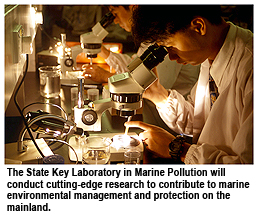Hong Kong establishes State Key Laboratory in Marine Pollution
Karen Cheng
Following approval from the Ministry of Science and Technology, Hong Kong has established the State Key Laboratory in Marine Pollution to help address the pressing need to protect China’s marine environment and biological resources.
In giving its endorsement, the Ministry commended the high quality of the research on marine pollution undertaken by the Hong Kong team and praised the laboratory’s first-rate facilities. The Ministry said that the laboratory will contribute significantly to research on marine environmental science on the mainland, which will have a lasting benefit for China and its people.
The laboratory is made up of a consortium of six partnering universities: City University of Hong Kong (CityU), Hong Kong Baptist University (HKBU), The Chinese University of Hong Kong (CUHK), The Hong Kong Polytechnic University (PolyU), The Hong Kong University of Science and Technology (HKUST) and The University of Hong Kong (HKU).
The partnership is dedicated to developing innovative chemical, biological and engineering technologies for the early detection, assessment, prediction and control of pollution impacting the marine environment. The research output resulting from this collaboration, in which CityU is the lead institution, has been at the forefront of global marine environmental research, attracting attention from all over the world.
Professor Paul Lam Kwan-sing, Director of the State Key Laboratory in Marine Pollution and Vice-President (Student Affairs) of CityU, said the joint research achievements of the Laboratory are the direct result of the partner universities in Hong Kong, pooling their individual strengths to benefit Hong Kong, the mainland and beyond.
Other key members of the laboratory include Professor Wong Ming-hung of HKBU, Professor Norman Woo Ying-shiu of CUHK, Professor Li Xiangdong of PolyU, Professor Wang Wenxiong of HKUST, and Professor Rudolf Wu Shiu-sun of HKU.
“We are very proud that we have been granted approval to set up the State Key Laboratory in Marine Pollution because it recognises our work,” Professor Lam said. “The research team is excited about undertaking cutting-edge research to contribute to marine environmental management and protection on the mainland.”
In addition to responding to the urgent need to protect China’s marine environment and ecology, the laboratory will also address complex environmental issues related to toxic chemical pollution, eutrophication, hypoxia, biological toxins and aquatic pathogenic bacteria. It will also focus on pollution-monitoring technology, impact studies on marine ecosystems, risk assessment, and pollution control and bioremediation.
The laboratory is also partnered with the State Key Laboratory of Marine Environmental Science at Xiamen University. The two groups will work together to make even greater contributions to research on issues related to the marine environment and sustainable development in China.